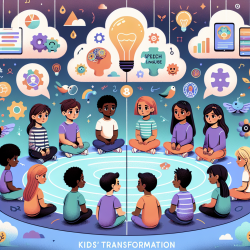Unlocking the Power of Peer Support: A Game-Changer for Adolescents with Chronic Illnesses
As a speech-language pathologist, you understand the complexities of managing chronic illnesses in adolescents. The recent study, "Better Together: acceptability, feasibility and preliminary impact of chronic illness peer support groups for South African adolescents and young adults," sheds light on the transformative power of peer support groups. This research provides valuable insights that can enhance your practice and improve outcomes for young patients.
The Research: A Data-Driven Approach
The study conducted in Cape Town, South Africa, involved 58 adolescents aged 13-24, living with various chronic illnesses, including HIV. The mixed-methods pilot study aimed to assess the acceptability, feasibility, and preliminary mental health impacts of a clinic-based peer support group called "Better Together."
Participants who attended at least five sessions of the peer support group showed statistically significant improvements in resilience, attitudes towards their illness, and reduced internalized stigma. The probability of being screened positive for depression was 23.4 percentage points lower, and for anxiety, it was 45.8 percentage points lower compared to those who did not participate in the group.
Implementing Peer Support in Your Practice
Based on the study's findings, here are actionable steps you can take to integrate peer support into your practice:
- Create a Safe Space: Facilitate a supportive environment where adolescents can share their experiences without fear of judgment or stigma.
- Encourage Diverse Participation: Invite adolescents with different chronic conditions to participate in the same group. This diversity can help normalize each condition and reduce feelings of isolation.
- Focus on Empathy and Understanding: Encourage participants to share their treatment regimens and disease management strategies. This can foster empathy and help adolescents accept their own conditions.
- Train Peer Mentors: Implement a peer mentorship program where experienced adolescents can guide and support their peers, providing a relatable perspective.
- Regular Sessions: Schedule regular peer support sessions to maintain engagement and provide consistent support.
Encouraging Further Research
While the study provides promising results, it also highlights the need for further research. A fully powered randomized trial is necessary to test the optimal implementation and causal mental health effects of the "Better Together" model. As a practitioner, you can contribute to this growing body of evidence by documenting and sharing your experiences and outcomes from implementing peer support in your practice.
To read the original research paper, please follow this link: Better Together: acceptability, feasibility and preliminary impact of chronic illness peer support groups for South African adolescents and young adults.
Conclusion
The "Better Together" study demonstrates the potential of peer support groups to significantly improve mental health outcomes for adolescents with chronic illnesses. By integrating these findings into your practice, you can help reduce stigma, enhance resilience, and foster a positive self-concept among young patients. Embrace the power of peer support and make a lasting impact on the lives of adolescents.










